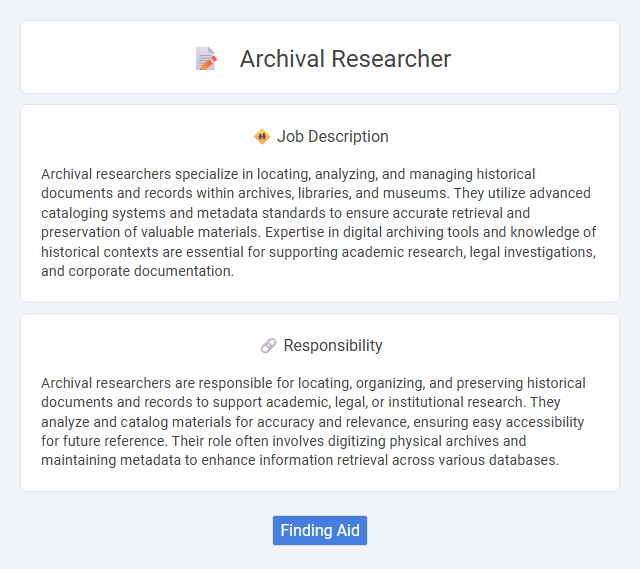
Archival researchers specialize in locating, analyzing, and managing historical documents and records within archives, libraries, and museums. They utilize advanced cataloging systems and metadata standards to ensure accurate retrieval and preservation of valuable materials. Expertise in digital archiving tools and knowledge of historical contexts are essential for supporting academic research, legal investigations, and corporate documentation.
Individuals who are detail-oriented, patient, and enjoy working with historical documents or data are likely to be suitable for an archival researcher job. Those who prefer structured environments and have strong analytical skills may find the role fulfilling. However, people seeking fast-paced or highly social work conditions might find this job less compatible with their preferences.
Qualification
An archival researcher requires strong analytical skills and proficiency in managing historical documents and digital databases. Expertise in cataloging systems, attention to detail, and knowledge of preservation techniques ensure accurate retrieval and conservation of archival materials. Advanced qualifications often include a degree in history, library science, or archival studies, coupled with experience in research methodologies and record-keeping software.
Responsibility
Archival researchers are responsible for locating, organizing, and preserving historical documents and records to support academic, legal, or institutional research. They analyze and catalog materials for accuracy and relevance, ensuring easy accessibility for future reference. Their role often involves digitizing physical archives and maintaining metadata to enhance information retrieval across various databases.
Benefit
Archival researchers likely benefit from gaining deep access to primary source materials, which enhances the accuracy and originality of their work. Their expertise might increase demand in academia, museums, and legal fields, potentially leading to specialized career opportunities. The role probably offers intellectual satisfaction through uncovering and preserving important historical information.
Challenge
Archival researchers likely face challenges related to the organization and accessibility of historical documents, which may be incomplete or deteriorated over time. They probably encounter difficulties in interpreting old handwriting, faded texts, or fragile materials that require careful handling. The complexity of tracking down relevant records across multiple archives might increase the time and effort needed to gather comprehensive data.
Career Advancement
Archival researchers specialize in locating, analyzing, and preserving historical documents critical to academic, legal, and cultural projects. Expertise in digital archiving technologies and metadata standards significantly enhances career growth opportunities within museums, libraries, and government agencies. Advancing in this field often involves developing specialized subject knowledge, project management skills, and professional certifications in archival science.
Key Terms
Finding Aid
An Archival Researcher specializing in Finding Aids systematically organizes and describes historical documents to improve accessibility for researchers. Mastery of metadata standards like EAD (Encoded Archival Description) enhances the precision of cataloging collections, facilitating efficient retrieval. Expertise in digital archiving tools enables the creation of comprehensive, searchable Finding Aids that support academic, legal, and cultural research projects.
 kuljobs.com
kuljobs.com